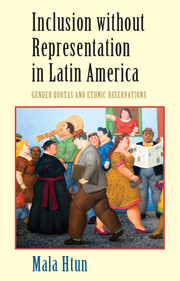Book contents
- Frontmatter
- Dedication
- Contents
- List of Tables and Figures
- Preface and Acknowledgments
- List of Acronyms
- 1 Introduction: Politics of Inclusion in Latin America
- 2 Women, Afrodescendants, and Indigenous Peoples in Elected Office
- 3 Gender Quotas: Why and How?
- 4 Indigenous Reservations and Gender Parity in Bolivia (written with Juan Pablo Ossa)
- 5 Political Inclusion in Colombia
- 6 Brazil: Combatting Exclusion through Quotas in Higher Education
- 7 After Quotas: Women's Presence and Legislative Behavior in Argentina (written with Marina Lacalle and Juan Pablo Micozzi)
- 8 Conclusion
- Appendix 1 Research Trips
- Appendix 2 Mechanisms of Inclusion
- References
- Index
8 - Conclusion
Published online by Cambridge University Press: 18 December 2015
- Frontmatter
- Dedication
- Contents
- List of Tables and Figures
- Preface and Acknowledgments
- List of Acronyms
- 1 Introduction: Politics of Inclusion in Latin America
- 2 Women, Afrodescendants, and Indigenous Peoples in Elected Office
- 3 Gender Quotas: Why and How?
- 4 Indigenous Reservations and Gender Parity in Bolivia (written with Juan Pablo Ossa)
- 5 Political Inclusion in Colombia
- 6 Brazil: Combatting Exclusion through Quotas in Higher Education
- 7 After Quotas: Women's Presence and Legislative Behavior in Argentina (written with Marina Lacalle and Juan Pablo Micozzi)
- 8 Conclusion
- Appendix 1 Research Trips
- Appendix 2 Mechanisms of Inclusion
- References
- Index
Summary
The demands of Latin America's marginalized social groups for greater access to power gained traction in the 1990s and the first two decades of the 21st century. Women, whose presence in power lagged their participation at the middle and bottom of parties, civic organizations, unions, and the private sector, mobilized across parties to demand national laws imposing gender candidate quotas on political parties in legislative elections. Boosted by regional trends toward multiculturalism and global norms of ethnic and racial equality, movements of indigenous peoples and Afrodescendants claimed rights to recognition and autonomy, guarantees of political inclusion, and access to higher education.
Many advocates of gender quotas and ethnic reservations expected they would improve not just the inclusion of Latin America's marginalized social groups but also their political representation, and produce better policy outcomes. This book has shown that the process was not so simple. Inclusion is not the same as representation. In fact, in the Latin American countries studied in this book, group inclusion was produced through institutional mechanisms that precluded group representation, at least along formal, principal–agent lines. Women, Afrodescendant, and indigenous representatives have been elected not by constituencies constructed from their category but by voters as a whole. Women did not enter power on behalf of women, but divided across parties and accountable to party leaders. Indigenous and Afrodescendant representatives elected to reserved seats were not accountable to voters from those groups. The activists and movements who worked to achieve inclusion had little control over who was elected, allegedly to represent them.
This conclusion considers the implications of the story of political inclusion in Latin America for our understanding of gender, gender equality, race, and ethnicity. I propose a way to think about the relationship between inclusion and representation and urge scholars to look beyond the legislature for mechanisms to represent disadvantaged groups. Finally, I affirm the value of inclusion. Quotas and reservations may disappoint the activists who fought for them by failing to deliver good representation, and by elevating non feminists, corrupt politicians, and party hacks. They may derive from a misdiagnosis of the best way to promote policy change. They may further elite racial projects and inadequate solutions to underrepresentation. Nonetheless, mechanisms of inclusion help to diversify the ranks of political leaders. They help to erode gender and racial biases. And they signal that everyone counts as a citizen.
- Type
- Chapter
- Information
- Inclusion without Representation in Latin AmericaGender Quotas and Ethnic Reservations, pp. 161 - 172Publisher: Cambridge University PressPrint publication year: 2016

